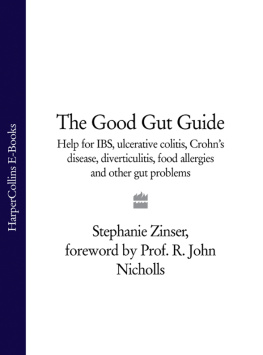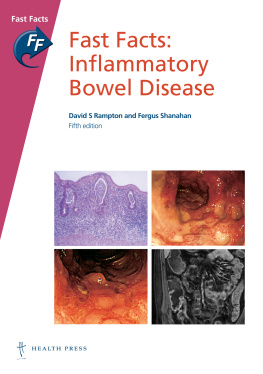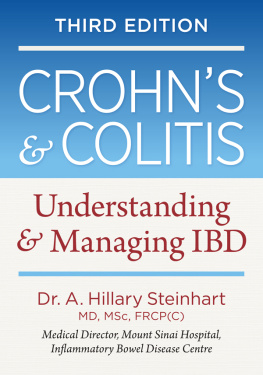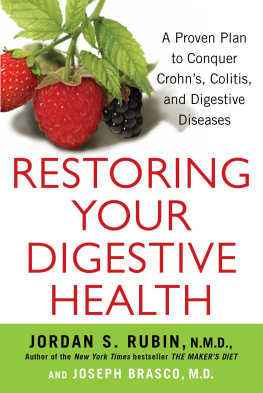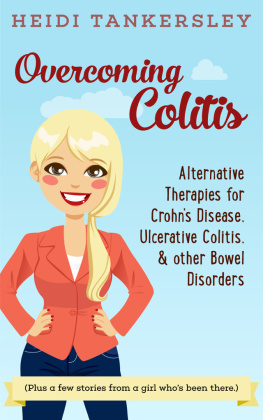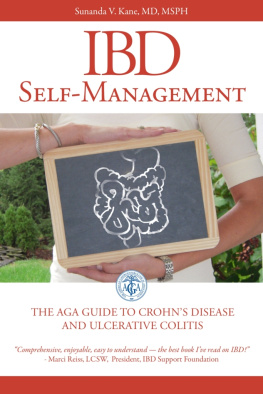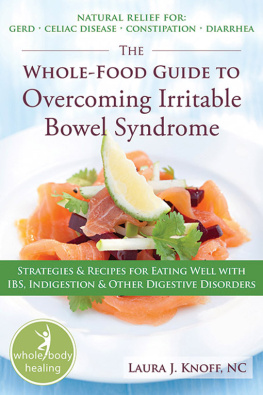
A man goes to his doctor with a piece of lettuce sticking out of his bum. He tells the doctor that he is a little concerned. After examining him, the doctor sighs and says, Im afraid its worse than I first thought thats just the tip of the iceberg.
In the last 20 years an increasingly informed public has acquired considerable medical knowledge. This has come through printed media, television and the Internet and by contact with health care professionals like doctors and nurses.
People working in medicine who understand the need for greater communication often find this terribly rewarding. Taking time to explain, honestly, the good and bad aspects of managing illness should nowadays be an essential part of every consultation between the patient and their doctor.
Everybody, including patients and their relatives, wants to know more about their health. The Good Gut Guide deals with intestinal diseases. Although this may at first seem to be a small part of the totality of medicine, intestinal diseases and problems are in fact very common. For example, Irritable Bowel Syndrome is one of the most frequent reasons for seeing a GP. While the condition is not life-threateningly serious, it accounts for a huge amount of suffering and has economic consequences because of time taken off work. Other intestinal diseases also have a great impact on individuals and society: infections, inflammatory bowel diseases such as ulcerative colitis and Crohns disease, and cancers are all disabling whether temporarily or more chronically to millions of people.
Inflammatory bowel diseases affect young people. In some cases they can be very severe but in most, medical and surgical treatment can keep them under control, allowing the patient to lead a normal life. Bowel cancer is the second most common malignancy in our society, yet if diagnosed early it is curable. Polyps can give us early warning. These are tumours in the benign stage, and if removed, there is every chance that their evolution into cancer can be avoided. Indeed, cancer prevention by appropriate screening, increasingly through genetic indicators, offers a real opportunity for doctors to improve the results of cancer treatment.
Anal problems are extremely common. Although not serious, piles, abscesses and ulcers such as fissures can make life miserable for millions of sufferers. Incontinence may make life impossible, confining sufferers to staying at home near the toilet, too fearful to venture out to the shops let alone to social occasions such as parties or family gatherings. The good news is that these diseases are almost always treated successfully.
The Good Gut Guide is an impressive creation. It covers a vast field and includes just about every area that can be related to the intestine. It is accurate, well informed, practical and readable. It gives the medical facts in an authoritative and balanced manner and, at the same time, offers vital advice on the holistic aspects such as diet and lifestyle that are not usually available in normal medical books.
It will help patients and anyone else who wants to learn more about intestinal problems and improve their gut health.
PROFESSOR JOHN NICHOLLS
When I first started suffering with proctitis in 1987, I was told it was a mild and localized form of ulcerative colitis, which was very unlikely to become serious or ever result in major surgery. Unfortunately, I was one of the unlucky few and 11 years later my entire large bowel was removed during a complex and lengthy operation.
It was very painful but, at the age of 34, I was more concerned about the prospect of wearing a bag for the rest of my life. I mistakenly believed Id have to wear baggy clothes and would never be able to enjoy scuba diving, swimming, or even lying on a beach again. However, I was given an internal pouch instead. This involved reconfiguring my intestines to make part of my small bowel into a reservoir for digestive waste, meaning that I could continue to go to the bathroom almost as normal. I thought it was great (despite a few practical limitations and the odd bout of pouchitis) not only did it enable me to live without self-consciousness, I was finally free of my UC. I was bursting with energy and enthusiasm.
Having spent the better part of 10 years explaining my illness to people, I was amazed at how taboo the subject of bowels was. We seemed to be at the same stage of ignorance and silence that breast cancer sufferers were 30 or 40 years previously when women were too ashamed to go to their doctor with a breast lump and when they, quite literally, died because of their embarrassment. But look at how all that has changed with massive health and charity campaigns raising public awareness of this terrible illness.
I wanted to see the same revolution for sufferers of bowel diseases. So, just days after leaving hospital, I made an impulsive call to the Daily Mails Good Health Editor at the time, Rory Clements. Despite having never written for publication before, I offered to write him an article on my experience. Amazingly, he took up my offer and the full-page feature was duly published in March 1998. It marked the start of my efforts to take the taboo out of bowel illnesses.
So why write this book now? For the same reasons I made that phone call. Statistically, you are more likely to be killed by a donkey than not suffer with some gut-related problem at some time during your life. Many gut problems including bowel cancers are more easily and more successfully treated when theyre picked up early. Taboos often prevent people from addressing problems until they are just too big and too serious to ignore, by which time it may be too late. Talk destroys taboos. Information saves lives.
I hope this book will help us to destroy the taboo, and enjoy good gut health.
When I was 25 years old I experienced a disturbing symptom bleeding from my bottom. Because I was then pregnant, I put it down to simple haemorrhoids and thought nothing more of it.
I never suspected that this was the beginning of a decades worth of increasingly serious illness that I would face virtually alone, unaided and only vaguely informed. It wasnt the doctors fault they told me what, medically, I needed to know. And there were support groups, although I tended to notice only the people who suffered far worse than I did. Because of this, I shied away from associating with them as if the seriousness of their illnesses might somehow be contagious.
Things that go wrong with your guts cause great embarrassment and this in turn makes them frightening. You dont automatically know who to talk to or what words to use, and when you do seek medical help the resulting procedures can be embarrassing as well as uncomfortable.
For some reason bowel and intestinal disorders have always been viewed as older peoples afflictions, despite the fact that most cases of ulcerative colitis (UC), Crohns disease and IBS start during a persons mid-twenties (or younger) when many people are single, embarking on relationships, starting families or juggling demanding careers and busy social lives. Im not sure why this false image has so stubbornly persisted, although I believe it is slowly changing.
As a health writer, I am regularly bombarded by information about new treatments not just from orthodox medicine, but also from the herbal, dietary and complementary sides. My personal view is that the key to a golden cure is not the preserve of any one of these camps. The answer to bowel illnesses is probably (and quite unsatisfactorily for those of us who like things neat and tidy) a complicated mixture of several elements, the proportions and exact ingredients of which we simply cannot isolate today. Its up to us to look carefully at every possibility, to try whatever we feel may be right for us, and work toward the best possible outcome good gut health.
Next page
